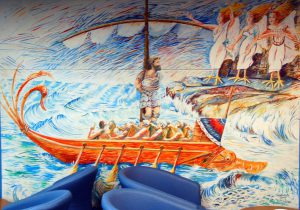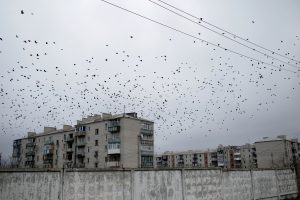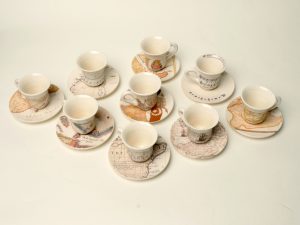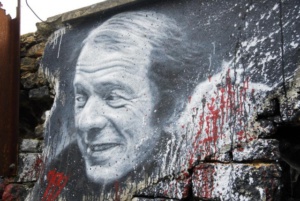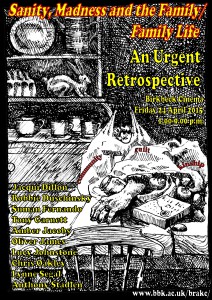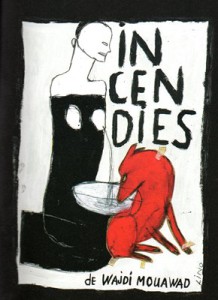Michaël Ferrier, Transnational Novelist – International One-Day Colloquium
Monday 18 March 2024 10:00 to 17:00 at the Keynes Library, 43 Gordon Square, London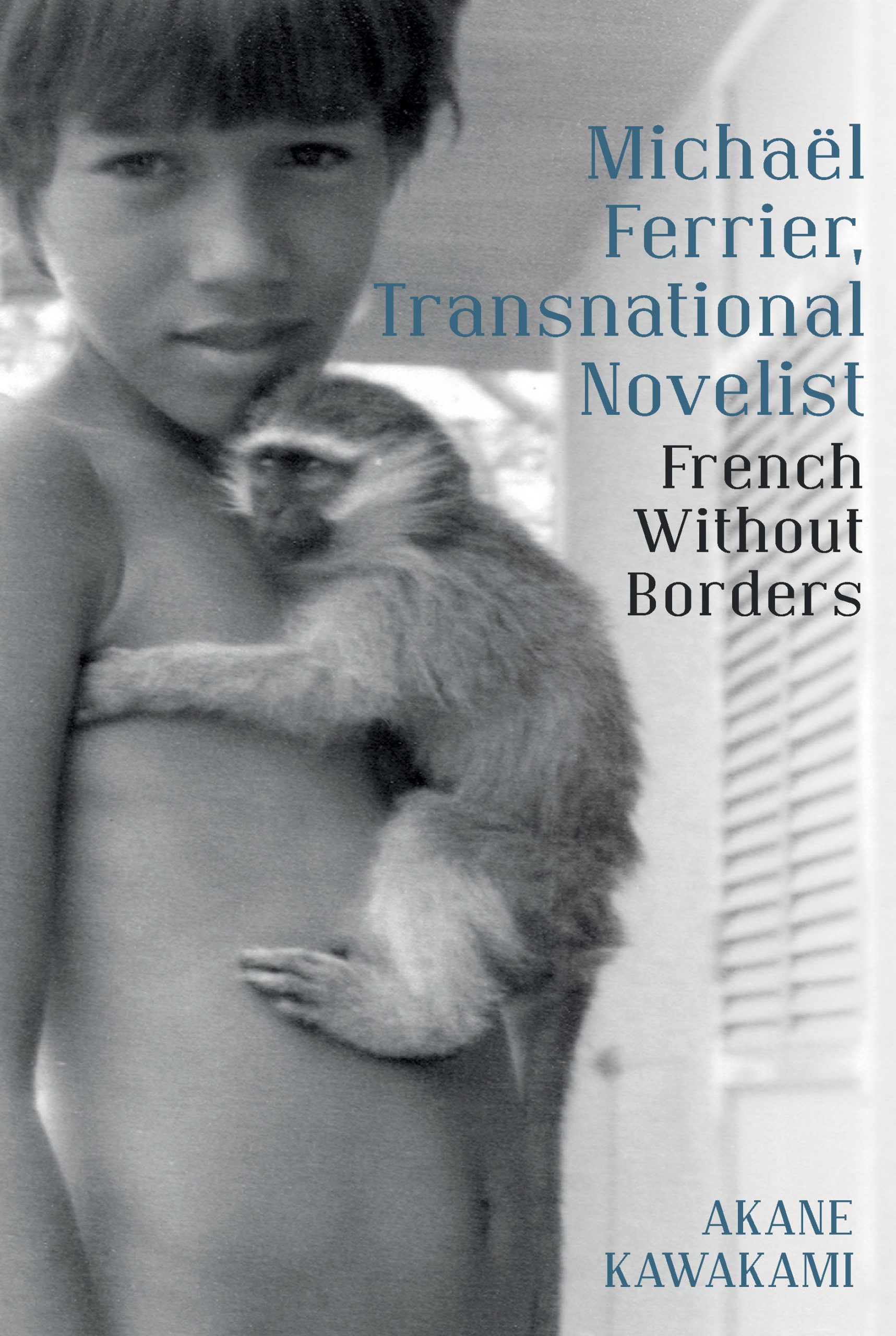
Michaël Ferrier conference programme
Michaël Ferrier is a prize-winning novelist, essayist and academic whose cosmopolitan life – he grew up in Chad and France, has Mauritian roots and lives in Japan – has inspired him to write some fascinating novels that cross generic and geographical boundaries. His works explore themes as various as an African childhood, notions of Frenchness, inter-identities, and post-Fukushima life in Japan. Hybridity is key to his themes, forms and genres, and his works include – as befits a twenty-first century author – a website called ‘Tokyo-Time-Table’.
This conference will bring together scholars from the UK, the US, France and Japan, as well as the author himself. It takes place on the occasion of the publication, by Liverpool University Press, of the very first monograph to be published on Ferrier’s writings – by Akane Kawakami (Michaël Ferrier, Transnational Novelist: French Without Borders, 2023) and the English translation of Ferrier’s Scrabble by Martin Munro (2022). Both books will be available at the conference.
Speakers will include Fabien Arribert-Narce, Timo Obergoker, Bernadette Cailler, Alexis Chauchois, and Akane Kawakami. All are welcome, and we hope for rich and varied discussions about the work of one of the rising stars of contemporary French and Francophone literature, a unique voice that crosses all kinds of borders across the globe.
Launch of the Centre for French, Francophone and Comparative Studies
 The launch of the CFFCS at Birkbeck took place on 18 March 2022 between 5 and 7.30 pm in the Keynes Library.
The launch of the CFFCS at Birkbeck took place on 18 March 2022 between 5 and 7.30 pm in the Keynes Library.
We kick-started the new centre’s programme of events with an evening on the theme of Food.
Guest speakers:
Professor Marion Demossier (University of Southampton)
“’La fin des terroirs ? A comparative ethnography of place and taste”
Dr Ruth Cruickshank (Royal Holloway, London)
“The Critical Consumption of Leftovers”
What Can Poetry Do For Community?
A Roundtable Discussion – Monday 5 July 2021, 6pm – Online
Guest Speakers: Sarona Abuaker, Kayombo Chingonyi, Jérôme Game, Fran Lock, Matt Martin
Chairs: Steve Willey (Contemporary Poetics Research Centre), Nathalie Wourm (BRAKC)
How does contemporary poetic practice engage with ideas of community? Does it provide any innovative perspectives on a type of relationality that can be conceived of as community? As a starting point, we can consider some of the notions put forward by Édouard Glissant in his Poetics of Relation (1990). If we accept his suggestion that relation can only be imagined, not defined, then it is clear that literature, poetry, and other creative arts represent a remarkable source of materials with which to consider concepts of community. Glissant, for instance, notes that paradoxically “the great founding books of communities, the Old Testament, the Iliad, the Odyssey, the Chansons de Geste, the Islandic Sagas, the Aeneid, or the African epics, were aIl books about exile and often about errantry.” Referring back to Gilles Deleuze and Félix Guattari’s A Thousand Plateaus (1980), he opposes the fixity of the rooted community based on the negation of the Other, to the nomadic, rhizomatic community of métissage, multiplicity, diversity, which he considers to be at its most accomplished today. So, if the conditions of relationality are made (a poiesis), how are they made in poetry right now? Is Glissant right in suggesting that selfhood and otherness have become porous, and that communities are now rhizomatic? What discourse does current poetic practice generate on community? And is it politically radical?
Each guest speaker will give a five-minute talk. This will be followed by a discussion and then by questions and comments from the audience .
This event is co-organised with Dr Stephen Willey, Director of the Contemporary Poetics Research Centre.

Burning Light into that Good Night is a 2021 moving image by artist Alda Terracciano featuring an interview with her terminally ill father a few weeks before his death, and her own reflections as she then grieves his loss. Together, they travel mentally through some memories that have a particular resonance for her father, who suffers from dementia. His eyes light up when he remembers events that have remained engraved in his memory till the very end – a dance, a comment by a former pupil…
The piece is only a few minutes long, but incredibly moving. The daughter’s careful and caring presentation of her dad and his memories filter through the subtelty of the filming and montage, and the silences that allow him to respond to her questions at his own pace. What is particularly striking, though, is the father’s own care and love for his daughter, which powerfully come through in his vivid glance, in his soft smile, and in the obvious effort that the exercise demands of him.
Terracciano’s choice of title reflects – perhaps unintentionally – this aspect of her father’s eyes as they light up for his conversation with her, burning light and taking it with him into the night. But the title is also, of course, an allusion to Dylan Thomas’s poem Do Not Go Gentle Into That Good Night, written as his own father was dying of cancer. There is no “raging against the dying of the light” in this piece, however. What comes across is an overwhelming sense of appeasement, a sense of the continuity of life and death. As Thomas refers to the “wise men” who “at their end know dark is right”, there is in Terracciano’s film, a wisdom, dignity and restraint that contrast with what could have easily been an over-emotional sequence of pathos. In this, both father and daughter are in agreement, and neither succumbs to an exaggerated expression of sentimentality. It is as if they were both trying to protect each other from the grief of a separation that is already at play.
In that sense, Burning Light into that Good Night, is a film about caring and about tenderness. While these qualities are never explicitely discussed, they are conveyed visually. The sobriety of the piece allows for these dimensions of the father-daughter relationship to be foregrounded. The film is also transformative in the way it expresses the forthcoming loss of each other as an event that is part of life, part of their lives as the film happens. Death is there within the frame, inhabiting life. And what comes through is a feeling of inner peace.
Nathalie Wourm
Seminar
19 May 2021, 19:30 — 20:30
Burning Light into that Good Night
A single-screen moving image based on a memory session recorded in the summer 2019 by artist Alda Terracciano with her father, a few weeks before his death.
Burning Light into that Good Night (2021, 7m) is a single-screen moving image based on a memory session recorded in the summer 2019 by the artist with her father, a few weeks before his death. The artwork explores memory as fleeting grasp of the self and care as impulse, positioning a man with dementia at the centre of his story.
Join us for a talk from its author, artist Alda Terracciano (Fellow, Birkbeck Centre for Contemporary Theatre), and a Q&A and discussion. Chaired by Fintan Walsh (Reader in Theatre & Performance, Director, Birkbeck Gender and Sexuality and co-director, Birkbeck Centre for Contemporary Theatre).
How to join this event
This event takes place online. You will receive an email one hour before the start of the event with a link to join. The email will come from messenger@bbk.ac.uk – please check your junk/spam inbox if you have not received the email one hour before the start of the event.
Find out more about Arts Weeks 2021 and book more events.
The video will be released prior to the event. You will receive a link to watch the video, and a link to join the talk and discussion event.
Supported by BiGS (Birkbeck Gender and Sexuality) and BRAKC (Birkbeck Research in Aesthetics of Kinship and Community).
JEAN-LUC NANCY AT BRAKC
We are pleased to announce that French philosopher Jean-Luc Nancy will be joining BRAKC for an online event on 17 December 2020 at 2pm (GMT). The discussion will start around Nancy’s new book Un trop humain virus (Bayard, 2020), and will then widen to other themes relevant to research on the aesthetics of community.
Jean-Luc Nancy does not need introducing. His philosophical interests are multiple and he has published widely. His work on community (see La communauté désoeuvrée, 1983), is of particular relevance to the concerns of BRAKC. Nancy’s latest book analyses coronavirus as a deconstructive agency within Western civilisation.
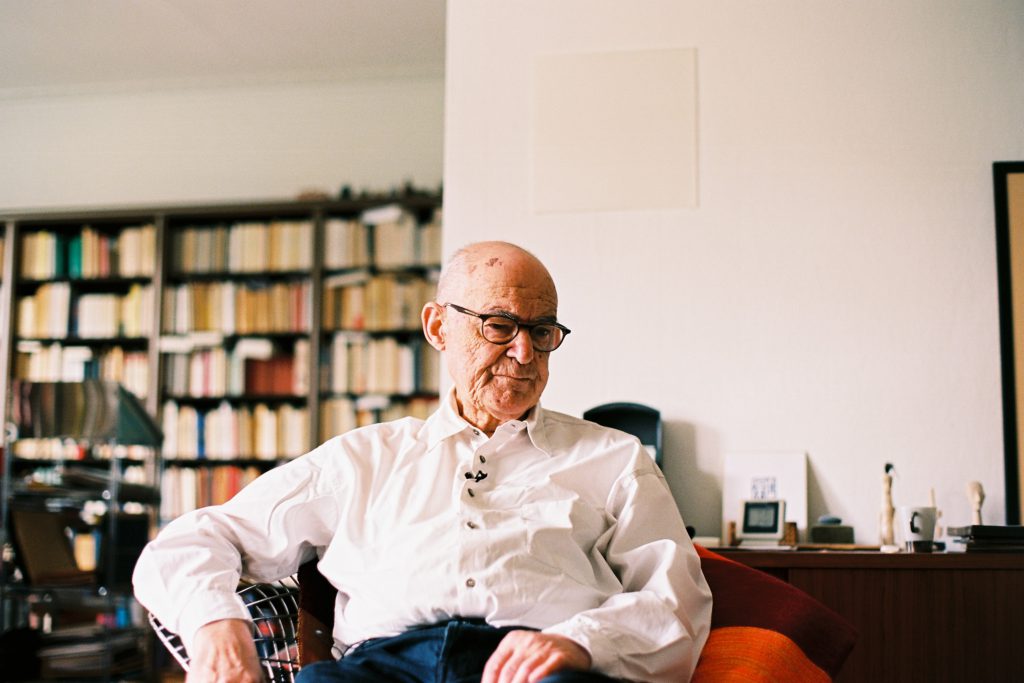
With thanks to Eduardo Jorge for this picture of Jean-Luc Nancy
Nancy will be in conversation with a panel comprising Dr Irving Goh (National University of Singapore), Dr Ian James (University of Cambridge), Dr Rémi Astruc (University of Paris-Seine), Dr Nathalie Wourm (Birkbeck, University of London).
The event will be in French but a link will be provided to access simultaneous automated translation. All welcome, no need to register.
The event will be recorded and posted on the BRAKC website for those who cannot attend the live session.
Please use the link below, and then click on “Continue on this browser” to avoid having to sign in.
Microsoft Teams meeting: Click here to join the meeting
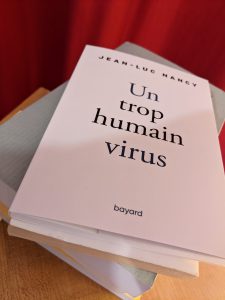
Link to the video recording
“The Scattered Community of the Eclipsed”
Paradigms of Belonging in the Wake of the 2020 Pandemic
An online event to take place on
Wednesday 17 June 2020
at 2.30 pm (GMT+1)
This online roundtable discussion is organised by Birkbeck Research in Aesthetics of Kinship and Community, a research centre based at Birkbeck, University of London and established 11 years ago. The main aim of the centre is to analyse, promote and commission artistic works of representation of the human bond in all its configurations, across cultures and history.
The event will centre around the screening of a short film in French with English subtitles, entitled Le noir de l’éclipse (The darkness of the eclipse), made during the lockdown by Eniko Fekete. The film, with strong Debordian accents, reflects on the various forms of belonging that have taken shape during the strange period of lockdown in the year 2020, when half of the world’s population was confined home in order to slow down the spread of a deadly virus. In this period, which Eniko Fekete likens to an eclipse, a type of darkness engulfed much of humanity, a new way of seeing normality was imposed on it, and alternative forms of being together had to be invented.
We will be joined by specialists on the aesthetics of community from around the world, to discuss the film and reflect on the many questions that stem from it. How might events like the lockdown, social distancing, whole household isolation, reconfigure our interpretation of artistic works that reflect on the multifarious concepts of community? Which philosophers, past and present might help us understand the new paradigms of belonging that have taken shape in recents months? And what forms of exclusion, of solitude or loneliness have these brought to light or made more acute? What does the slight shift in reality which we experienced tell us about old paradigms of togetherness, perhaps the ones we will go back to, perhaps not? And what does it tell us about our ability to adapt to new ways of being? We will be referring to literary, philosophical works, films, and other art works to illustrate our ideas and inform our discussion.
Guest speakers will include:
Niall Bond (Lyon 2, France), Irving Goh (NUS, Singapore), Ian James (Cambridge, UK), Élodie Laugt (St Andrews, UK), Cory Stockwell (Bilkent, Turkey | currently in the USA), Nathalie Wourm (Birkbeck, UK).
To book a place and receive a link nearer the time, please register at: http://www.bbk.ac.uk/events/remote_event_view?id=13869
The link to the film that will be screened is: https://vimeo.com/428529801
Michaël Ferrier Conference
18 September 2019, 13:00-17:00
Birkbeck, 43 Gordon Square, Keynes Library
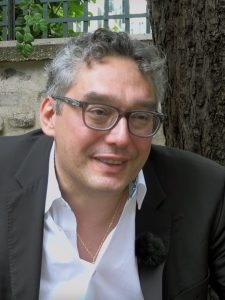
Michaël Ferrier (2018)
By librairie mollat – Youtube, CC BY 3.0, https://commons.wikimedia.org/w/index.php?curid=72511965
An afternoon of talks and discussion, with Michaël Ferrier, the acclaimed French writer, who will be visiting us from Tokyo where he lives.
Speakers will include Martin Munro (Florida State), Anne-Gaëlle Saliot (Duke), Charles Forsdick (Liverpool) and Akane Kawakami (Birkbeck, London).
Based loosely on the author’s life, Mémoires d’outre-mer recounts the life of Ferrier’s Mauritius-born grandfather, Maxime, who in 1922 abruptly boarded a boat bound for Madagascar and never returned. Maxime’s adventurous and romantic life in Madagascar, which included a stint as a diver, an artist, and an acrobat in a travelling circus, is bound up with the island’s history, including its period as a Vichy-governed territory at the centre of what was called ‘Project Madagascar’, the Nazi plan to relocate Europe’s Jewish population to the island. This story in turn is interwoven with the larger story of colonialism and its lasting and complicated impact on French national and cultural identity today.
Join us at Birkbeck on 18th September 2019 for a discussion of this novel and its translation, as well as of Ferrier’s other works.
The event is free but please book as places are limited: Book Here
Michaël Ferrier is professor of French at Chuo University in Tokyo, Japan; he is also an essayist and the award-winning author of several novels. Mémoires d’outre-mer, his most recent work, has been translated into English as Over Seas of Memory by Martin Munro, Winthrop-King professor of French and Francophone Studies at Florida State University.
This event is organised by Akane Kawakami and by the BRAKC research centre (Birkbeck Research in Aesthetics of Kinship and Community). If you would like to give a short paper on any aspect of Ferrier’s work, please contact Akane Kawakami (a.kawakami@bbk.ac.uk).
Aesthetics of Community Network Symposium
9 September 2019
Birkbeck, Malet Street, room 633, 13.00-15.00
Conceptualising Community in Germany and France
Ferdinand Tönnies, Jean-Luc Nancy, W.G. Sebald
This event is free but please book as places are limited: BOOK HERE
Dr. Niall Bond (Université Lumière – Lyon 2, France)
The ambivalence of the signifier “community” in English, German and French
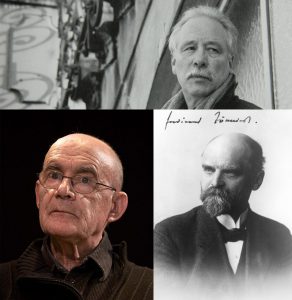
W.G. Sebald, Jean-Luc Nancy, Ferdinand Tönnies,. (Nancy picture credit: Georges Seguin (Okki) [CC BY-SA 3.0 (https://creativecommons.org/licenses/by-sa/3.0)])
Dr. Cory Stockwell (Bilkent University, Turkey)
Senses of the Common
_________
Dr Rémi Astruc (Université de Cergy-Pontoise, France)
A presentation of the book The Undercommons: Fugitive Planning and Black Study by Stefano Harney and Fred Moten (Minor Compositions, 2013). The book is available for free online.
Abstracts
Niall Bond – The ambivalence of the signifier “community” in English, German and French
The word “community”, like all words according to Nietzsche, is a prejudice. (“Jedes Wort ein Vorurteil”). Or perhaps more accurately, a catalogue of prejudices from one can pick and choose. It can be used to be descriptive or prescriptive, i.e. normative or performative. Raymond Plant saw in the word a promise, a substantive that was used only to evoke positive and desirable relationships. However, in continental discourse, the term has been far more contentious. In post-war Germany, for instance, the reminiscence of the term Volksgemeinschaft and its abuse by the Nazis has impeded the “innocent” use of the word Gemeinschaft in broader political discourse. Volksgemeinschaft, a term that was used by almost every political formation in the Weimar Republic, at times even in the service of a liberal set of ideas, was identified with a State which decided which foreign bodies, Gemeinschaftsfremde to persecute and to annihilate. The problem here was the exclusivity with which individuals were forced to seek their identity in the nation state. French-speaking thinkers did not face the same problem with the term “community”, inasmuch as the term “communauté nationale” was as in vogue among Gaullistes as it was among Pétainistes,
but mostly because the use of political discourse was not subject to the same historical scrutiny as was seen in Germany’s Vergangenheitsbewältigung. This is to be seen in a series of writings, influenced by Tönniessian ideas, emerging after the 1980s, for instance in the philosophy of Nancy.
Asserting the priority of identification with the national community has been a political near impossibility in post-war Germany and remains highly problematic. In France, well after the war, but principally from the 1990s, the derivative “communautarisme” came to be used in a pejorative manner in France’s media and by France’s political figures: here, the problem seemed to be community appurtenances that challenged the nation’s monopoly over political appurtenance and identity. When announcing he would not run for a second term, France’s President François Holland announced he knew one community and one community alone: the French nation. He did so against the backdrop of acts of terrorism and division which revealed to what extent national unity was fragile. He also did so, however, in the context of European Union, which lays claim to community loyalty expressed in citizenship and whose ideal roots the jurist Werner Gephart traces back to Tönnies. Does the Nation State have not just the monopoly over the use of legitimate violence, but equally over love and identity? The historic semantics of community and identity are of the utmost importance in safeguarding fundamental freedoms – the freedom to choose whom we love – while preserving peace. Unravelling these semantics of community will allow us to get a better grasp upon our common humanity and common European history.
Cory Stockwell – Senses of the Common
On at least two occasions in the 1990s, Jean-Luc Nancy employed Nietzsche’s dictum “the desert grows” to think about the political and indeed existential situation of the time, a situation in which all meaning collapses into (to employ a term to which Nancy has turned more recently) a general equivalent, in which meanings differ from one another only in degree, never in kind. This leaves us in a paradoxical situation in which meaning, collapsed into this general equivalency, has never been more common, yet at the same time rejects the very principles of community that Nancy has formulated, since there is nothing singular about it, since it is entirely closed in on itself, and since it rejects the possibility of the unforeseeable. One is tempted to ask how might it be possible to find a way out of this general equivalency or growing desert, but this paper will argue that this is the wrong question: that it is only, as Nancy suggests, by locating resources put forth by the desert itself that we might find, not so much new ways of creating meaning, but regions in which such meanings, such senses, have already begun to form. Drawing upon literary examples from W. G. Sebald, this paper attempts to think just such possibilities of sense, senses of the common that do not so much escape as cast a new light upon the deserts in which they arise.
Depicting Donbas: Creative and critical responses to the war in Ukraine
On Thursday 25 and Friday 26 April 2019, we host Depicting Donbas: Creative and critical responses to the war in Ukraine, a series of three events over two days exploring how artists across genres are responding to the ongoing military conflict in Ukraine’s eastern Donbas region.
On Thursday 25 April from 6-7:30pm we host Ukrainian writers Iryna Shuvalova, Iryna Starovoyt, and Olena Styazhkina for a reading and discussion of their works. The reading will take place in the Masaryk Room at UCL’s School of Slavonic and East European Studies.
On Friday 26 April from 10am-4:45pm we hold a symposium at Birkbeck School of Arts featuring presentations and discussion with Ukrainian writers, theatre artists, photographers, filmmakers and academics on the role of creative practice during times of conflict. Click here for more details on speakers and details of the programme.
Following the symposium on 26 April from 7-9pm our Centre for Contemporary Theatre presents a documentary theatre performance from Ukraine’s Theatre of Displaced People written and performed by Alik Sardarian and Natalia Vorozhbyt, directed by Georg Genoux.
The reading, the symposium, and the evening performance are all free and open to the public. Registration is required. Symposium participants will be given priority for attendance at the evening performance on 26 April. Separate tickets for the performance will be released at a later date pending availability.
For more info please contact the conference organisers Molly Flynn (Birkbeck) and Uilleam Blacker (UCL).
Depicting Donbas is made possible with support from Birkbeck Research Centres Collaboration Fund, UCL Octagon Small Grants, Birkbeck School of Arts Strategic Research Fund, Birkbeck Centre for Contemporary Theatre, Birkbeck Research in Aesthetics of Kinship and Community, and Birkbeck Gender and Sexuality.
BRAKC Postgraduate Symposium
Friday 30 November 2018
2 – 4.30pm
Birkbeck, Malet Street, G14
This roundtable event aims to bring together the wealth of postgraduate research being accomplished on the artistic representation of the familial, the social, the political, its criticism and re-conceptions. To book a free place, please email Nathalie Wourm at n.wourm@bbk.ac.uk.
Deniz Sözen (University of Westminster, Visual Arts)

Deniz Soezen: Trans Plantations (2018), Installation Shot. Photo: David Freeman
(Courtesy of the artist)
Thinking through coffee: Thinking through clay – Belonging beyond the human
Carly Robinson (Birkbeck, Arts and Humanities)
Auto-theory as becoming-narrative; queer family making and transforming bodies in Maggie Nelson’s The Argonauts
Refreshments
Guest: Molly Flynn, Lecturer in Theatre and Performance (Birkbeck, English and Humanities)
Presentation of the forthcoming symposium “Depicting Donbas: Critical and creative responses to the current armed conflict in Ukraine”
Ross Belson (Birkbeck, Victorian Studies)
‘The Neglected Poet’: the life and parentage of Brinsley Norton [working title]
Dalila Villella (Birkbeck, French Studies)
Rhizomatic writings: new scenarios for humanity
ABSTRACTS
Deniz Sözen (University of Westminster, Visual Arts)
Thinking through coffee: Thinking through clay – Belonging beyond the human
My practice-based research sets out to explore and develop new artistic strategies that destabilize fixed notions of belonging and identity in the context of globalization and diasporic art. Searching for ways to decolonize and transcend dualistic thinking, initially my project of un-doing belonging had envisaged the exploration of binary conceptions of self/other solely in relation to ethnic and cultural difference. My artistic research exploring belonging in relation to ceramics and coffee, the materials and mediums I use in Kahvehane Kongresspark (2016) and Trans Plantations (2018), instigated a different approach. Working with coffee and ceramics led to a major shift in my thinking: through my hands-on engagement with the material, I suddenly became aware of my interconnectedness with matter. This led an unexpected and sudden change of direction in my research.
In this presentation I intend to share how the direction of my research shifted through my practice of working with coffee and ceramics and how I came to appreciate what I would call “the secret of the earth”: the knowledge about the vital force of matter and the complex web of relations in ecological assemblages. Reflecting on the agency of matter, I realized that I had to broaden the scope of my discussion with regard to belonging and expand the notion of the ‘other’ to include what Braidotti has coined as ‘earth others’ (Braidotti, 2006).
Thinking nomadically and traversing different theories, the analysis of the agency of matter is developed in relation to contemporary art practices. Following the question, how art could challenge an anthropocentric conception of belonging, Mona Hatoum’s Present Tense (1996), my own work Kahvehane Kongresspark (2016) and Trans Plantations (2018) serve as case studies to explore artistic strategies that challenge our anthropocentric approach towards belonging through the ways we relate to material culture, plants and (edible) matter.
Carly Robinson (Birkbeck, Arts and Humanities)
Auto-theory as becoming-narrative; queer family making and transforming bodies in Maggie Nelson’s The Argonauts
In this paper I will be discussing Maggie Nelson’s The Argonauts as text which reconfigures ideas about family, gender and relationships through the innovative use of literary form. Using a mix of personal life writing, theory and criticism together with a self-reflexive meditation on the personal and political paradigms of being in the world, The Argonauts opens up a space for re-thinking ideas on language, motherhood, family connections and bodies in flux. Nelson’s book loosely described as auto-theory and genre-defying employs a new medium of writing which, I will argue, acts as a becoming-narrative as part of a Deleuzo-Guattarian inspired movement of change within current literary production. Using their concept of becoming-woman, I will read Nelson’s text as a narrative of transformation and affect for both author and reader which bypasses normative modes of production. Nelson navigates a journey of discovery as she explores her burgeoning relationship with artist Harry Dodge and their beginnings of family life through the process of writing and connects her personal experiences to theoretical ideas from thinkers and writers such as Donald Winnicott, Sara Ahmed, Luce Irigaray, Eve Sedgwick, Audre Lorde and Beatriz Preciado. Through her fluid like prose the reader is also brought into that becoming to bear witness and participant in forging these connections of theory to real life, engaging in their own self reflexive trajectories of affect.
Ross Belson (Birkbeck, Victorian Studies)
‘The Neglected Poet’: the life and parentage of Brinsley Norton [working title]
My paper will explore the kinship relationships of [Thomas] Brinsley Norton (1831-77), the poet son of women’s rights reformer, Caroline Elizabeth Norton, whose letters are the focus of my PhD (UWE 2016) and post-doctoral research, which will culminate in an edition of her letters: https://www.routledge.com/The-Selected-Letters-of-Caroline-Norton-Vol-1/Belson-Mulvey-Roberts/p/book/9781138762701 The paper will utilize Brinsley’s letters, poems and ‘autobiography’ (in fact by Carlo Knight), Le Memoire Postume di Lord Grantley (2005), together with Caroline’s letters and other correspondence by family and friends.
Separated from his mother when aged only four, Brinsley was placed for six years with his aunt Grace Menzies, who allegedly physically abused him on the misapprehension that he was the son of Lord Melbourne. Although it is now clear that Caroline’s husband George was Brinsley’s biological father, this did not prevent the rumour becoming key to a relationship break-down accelerated by other factors: Brinsley’s rebellious nature, the brain damage he had suffered as a boy and George’s bullying of both his children and his wife, who gained custody of her sons in 1842.
In 1853 Brinsley married the daughter of a Capriote farmer, with whom he raised a family, emerging in 1859, with the death of his elder brother, as de facto heir of both his father and wealthy uncle, Lord Grantley. By this time exiled to Italy, by his father’s orders and his own debts, which George refused to settle, Brinsley moved to Florence, where he was mentored by Robert Browning. However, Brinsley’s inaugural collection of poems, Pinocchi (1856), was not well received and he is not known to have published subsequently, his health declining over ensuing decades. By the time of his death in 1877, aged 45, Brinsley was 4th Baron Grantley in name only, his father’s and uncle’s capital and property having by then been devolved to his son.
Dalila Villella (Birkbeck, French Studies)
Rhizomatic writings: new scenarios for humanity
The rhizome is a concept elaborated by Deleuze and Guattari in 1976 with the aim of highlighting the artificiality of the social, political and economic organisation of reality and showing the possibility of changing the world by semiotically re-interpreting and re-organising it.
Deleuze and Guattari described the rhizome as something heterogeneous, multi-directional, decentralised, with no start and no end and characterised by infinite interconnections and overlaps. Its functioning is particularly useful to both explain how capitalism – and in a broader way any kind of power – imposes itself, subordinating the entire reality to its structures, profoundly conditioning the human experience and provide humanity with the revolutionary tools to reconstruct the world.
The purpose of my paper is to analyse how the adoption of the rhizome is influencing the way 21st century French poetry is representing and conceiving the collective human experience by deconstructing all the binary oppositions at the base of the hierarchical organisation of reality imposed by capitalism.
By focusing on the works of Anne-James Chaton, Dominique Fourcade, Jean-Michel Espitallier, Jean-Marie Gleize and Éric Sadin, I will show how contemporary poetry – hitting the language, the concept time, the idea of politics and the value of the human life elaborated by capitalism – frees humanity from the normalising processes activated by this political and economic system to create standardised human beings.
In doing that, rhizomatic writings constantly transform any aspect of reality showing the revolutionary power of the becoming and opening up the way for new scenarios; they show the possibility of different futures and different alternatives for humanity inevitably leading to rethink people’s subjectivity, human relationships and interactions as well as the way mankind connects with the non-human.
Deleuzian Impoverishment:
New Research in Aesthetics of Community
Monday 14 November 2016, 1-3pm, room 112, 43 Gordon Square, London WC1H OPD
This is BRAKC’s first symposium of the 2016-17 academic year. We will be welcoming academics from Turkey, France and Malta, who will present us their recent research in the aesthetics of community.
Refreshments will be served. To book a place, please contact Nathalie Wourm at n.wourm@bbk.ac.uk.
Cory Stockwell (Bilkent University, Ankara, Turkey)
Deleuzian Impoverishment
Anyone interested in the theme of impoverishment in Deleuze’s work will find it in many different forms, such as subtraction, reduction, and exhaustion; and in many different places, for instance the beginning of one of Deleuze and Guattari’s most celebrated texts, A Thousand Plateaus. In the first plateau, “Rhizome,” in a discussion of multiplicity, they insist that the multiple “must be made,” and that the way to do this is via what they term the n – 1: “the only way the one belongs to the multiple: always subtracted.” It would be difficult to think the question of community from the perspective of Deleuze and Guattari’s work, in other words, without taking this subtraction into account. But does this thought, a thought of both the multiple and the fragmentary, not nonetheless, in the subtlest of manners, leave unity intact? This paper, through a reading of A Thousand Plateaus (with particular attention paid to the analysis of Pierre Clastres in this work), and drawing upon Roberto Bolaño’s 1996 novel Distant Star, argues that unity always lies in the background of Deleuze and Guattari’s thinking of multiplicity; but that, at the same time, these thinkers provide us with the very tools necessary, not so much to go beyond as to distance ourselves from this unity, by way of an act of impoverishment.
Cory Stockwell is Assistant Professor in the Program in Cultures, Civilizations, and Ideas at Bilkent University, Ankara, Turkey. His work has appeared in journals such as the Oxford Literary Review, CR: The New Centennial Review, and SubStance. His current book project deals with the place of stars and other “heavenly bodies” in the work of Kafka, Lispector, and Bolaño.
Thierry Tremblay (University of Malta)
Senses of Community
The notion of Community has been and still is at the centre of philosophical, political and social debates in the West. The word Community has different etymological roots in European languages (e.g. κοινός in Greek, Gemeinschaft and Gesellschaft in German, společenství in Czech or yhteisö in Finnish). Roman languages and English may share the same word (stemming from the Latin Communitas), but their meanings and uses diverge: a community is not, for instance, always a communauté. This short paper will try to make sense of the different words expressing the “common” of the community.
Thierry Tremblay is Senior lecturer at the Department of French at the University of Malta. He taught literature, literary theory and philosophy at the University of Cyprus, Charles University in Prague and the Anglo-American University in Prague. He is a member of CCC (Communauté des Chercheurs sur la Communauté). He is the author of Anamnèses: Essai sur Pierre Klossowski (Hermann, 2012), Frontières du sujet: Une Esthétique du déclin (L’Harmattan, 2015) and is the editor of the special issue on Pierre Klossowski for the journal Europe (2015).
Rémi Astruc (Université de Cergy-Pontoise, France)
The Aesthetics of Community in Contemporary Thought
What is it that brings us together and allows to feel a sense of shared experience and existence with people whom we don’t even know? Why is it that the question of community remains highly important, despite an increasing majority of individuals who are less and less in contact with actual forms of living in common? Why (and how) is it that art – in the first place, narrative arts (telling tales, novels, films) but also dancing or poetry – occasionally allow us to feel that we belong to a community of beings?
Astruc argues it is because, through the arts (and beyond one’s conscious will), community not only unveils itself, but also, if we are in a position to be affected by it, ‘speaks’ itself to us and acquires a form in doing so. He will present the research he is conducting alongside an international network of researchers (the ‘CCC’) focused on the notion of community across disciplinary frameworks, including two new works published in 2016: a book-length essay entitled Nous? l’aspiration à la communauté et les arts and La Communauté revisitée/Community Redux. Both books explore the actuality of the notion of Community in contemporary thinking as it relates to the issues that define our present, ultimately seeking to understand what can still bring us together in societies where the answer to this question remains largely unclear. This roundtable presentation and discussion will provide an opportunity to share research concerns on all aspects of thinking Community—in the past, present, and future—on a multidisciplinary level. It will also provide the occasion to learn more about the “CCC” and its future activities.
Rémi Astruc is Professeur de littératures francophones et comparées at Université de Cergy-Pontoise, where he was also Director of the Department of Literature. He is an expert on representations of identity and community in literature, comedy and the grotesque, and the anthropological function of literature, and is the author of numerous books and articles on these themes.
SANITY, MADNESS AND THE FAMILY / FAMILY LIFE: an urgent retrospective
24 April 2015
1pm – 9pm
Birkbeck Cinema, 43 Gordon Square,
London WC1H OPD
It is just over 50 years since the publication of Sanity, Madness and the Family, R.D. Laing’s and Aaron Esterson’s groundbreaking study of “schizophrenia” in 11 young women. Birkbeck Research in Aesthetics of Kinship and Community (BRAKC) and the Birkbeck Guilt Working Group have organized a one-day symposium at Birkbeck Cinema, 43 Gordon Square, London WC1H 0PD, on Friday 24 April 2015 (1pm-9pm) to discuss the lasting impact of that book.
Do people still read it? Why is it almost never referred to in psychotherapy trainings in this country? How have the ideas it introduced been either absorbed into or rejected by clinical, academic and more general discourses about the family and mental/emotional illness?
Andrew Asibong, co-director of BRAKC, will facilitate the event, and participants will include Jacqui Dillon, Robbie Duschinsky, Suman Fernando, Amber Jacobs, Oliver James, Lucy Johnstone, Chris Oakley, Lynne Segal and Anthony Stadlen.
The symposium will culminate in a screening at 7pm of Ken Loach’s 1971 film Family Life, introduced by the producer of that film, Tony Garnett.
For more information or an electronic copy of the conference poster please contact Dr Andrew Asibong (a.asibong@bbk.ac.uk)
Register on Eventbrite: http://www.eventbrite.com/e/sanity-madness-and-the-familyfamily-life-an-urgent-retrospective-tickets-15926612928
Animal-Human Kinship and Community in French Literature
Chair:
Professor Michael Sheringham
Marshal Foch Professor of French Literature
All Souls, University of Oxford
Speakers:
Professor Andrew Billing
Macalester College, St Paul, Minnesota
“Political Anthropology and its Animal Other in Rousseau”
Podcast
Professor Shirley Jordan
Queen Mary College, University of London
“Hospitality and the Animal World in Marie NDiaye”
Podcast
Friday 5 July 2013
2-4 pm, room 124, 43 Gordon Square, London
Flaubert, Beckett, NDiaye: The Aesthetics, Emotions and Politics of Failure
A one-day symposium at Birkbeck, University of London,
Monday 7 January 2013
Gustave Flaubert (1821-1880), Samuel Beckett (1906-1989) and Marie NDiaye (1967-) form a fascinating ‘family’ of nineteenth-, twentieth- and twenty-first-century novelist-playwrights writing in French. Profoundly implicated in certain key social struggles of their times, Flaubert, Beckett and NDiaye can at the same time be considered as models of radical disengagement, apparently happy to isolate themselves from the world and its horrors in the tried and tested posture of the remote and cut-off artist. Failure hovers on the horizon of every one of their works, as protagonists and texts alike slide inexorably into unmanageable states of paradox, incompletion and disintegration. This ‘failure’ is at once aesthetic (the texts themselves fail to deliver the meaning the reader needs or expects), psychic (the characters fail to perform subjectivities that can be unified by a coherent or feeling self) and political (the artist and celebrity, having evoked a social situation that demands a clear response, fails to offer one).
What is at stake in the work of Flaubert, Beckett and NDiaye, aesthetically, emotionally and politically, as it pushes the reader or spectator to the very limits of tolerable uncertainty? What are the cultural and psychosocial implications of their experiments in splitting and negativity, which seem to indulge the most cynical aspects of nihilism while at the same time grappling with the very foundations of politicized and psychic truth? And how do Flaubert, Beckett and NDiaye call out to one another across the gendered, racialized, economic, cultural and temporal spaces that separate, crack and isolate them? More details in the Conferences page.
organised by Dr Aude Campmas
Date: 29 September 2012
Start time: 11.00
End time: 12.30
Location: Keynes Library, 43 Gordon Square
Free entry; open to all
Representing the Community and the Family
Geoff Brown (Birkbeck)
‘Circles within circles: narrative structure in the films of Claire Denis’
Alexander Corcos (Birkbeck)
‘The true radicalism of Francois Ozon’
Enslavement, Transmission and Trauma
in Contemporary Fiction
by writer Jenny Mitchell
Rachel Chonka (Birkbeck)
Chantal Quiquine (Birkbeck)
Time: 2 – 5pm
Location: Room B03, 43 Gordon Square, Bloomsbury
(Richard Fleischer, 1975)
Location: Room 421, Malet Street, Bloomsbury
Free entry; open to all
“Can mainstream romantic fiction be used to re-examine the legacies of transatlantic enslavement, and suggest that the ‘slave-owners’ condemned their descendents to trans-generational trauma?”Jenny Mitchell
Francophone Writing of the Lebanese War
by Dr. Aude Campmas (Birkbeck), Dr. Claire Launchbury (Royal Holloway), Dr. Helen Vassallo (University of Exeter)
Date: 23 February 2011
Start Time: 2pm
Location: Clore Management Centre, room 204, Torrington Square, London WC1 7HX
Free entry; open to all
***
Le sang des promesses: Liens et lignages dans Incendies de Wajdi Mouawad.
(Please note that this paper will be delivered in French)
“The mother of Jeanne and Simon, Nawal, dies locked into a silence that her children do not understand. The testament she leaves them is a mission, an inquiry: they have to give out two letters, one to their father (whom they believed dead); the other to their brother (whom they never knew they had). From Canada, therefore, begins an Odyssey of the memory to Lebanon. This spatial journey mirrors a journey in time, taken to understand the dramas as yet hidden from a family, from a country; to discover the links that unite and define kinship, communities and above all the individual. Of all the links, the promise is the only one which resists war and family blood-ties: Wajdi Mouawad replaces blood with promises. Using the work of Maurice Blanchot and Hannah Arendt as a starting point, I propose to study how the promise to the other defines the identity of these characters, how this link replaces family ties, and how it is the only link that lets people forgive. The promise is a word-bond: an engagement but also a sign to decipher.”
Aude Campmas
***
Le futur de mon temps : Topographies of dwelling and belonging in Francophone writing of the Lebanese war
“Beirut and the experience of its destruction through the course of the Lebanese war took on a figurative resonance that challenges the contingency of time in the selection of woman’s writing under analysis in this paper. While divisive factions fundamentally undermined communities, and identities were reconfigured through political and social expediency, the desire to chronicle and to document through an imaginary that encompasses the archive (Nadia Tuéni), dwelling places (Andrée Chedid) and the everyday (Fathia Saoudi) brought together mixed consciousnesses of Lebanese topographies of memory. Negotiating a literary space within the linguistic, ethnic and religious diversity of the divided city involved reassessment of belonging, carving out a space and finding a voice while the very security of a personal dwelling place was under persistent threat. Specifically through examination of the figure of the archive in these texts and how it is situated at the intersection of temporal contingency and the continuity of representation, this paper examines the topographies of the dwelling place in accounts of war-ravaged Beirut.”
Claire Launchbury
***
‘Nous n’avions ni communauté ni confession’: The alienation of ‘liberation’ in Darina Al-Joundi’s Le Jour où Nina Simone a cessé de chanter
“This paper examines the 2008 text Le Jour où Nina Simone a cessé de chanter, written by Lebanese author Darina Al-Joundi. Le Jour où Nina Simone a cessé de chanter recounts Al-Joundi’s true story of growing up in Beirut during the Lebanese civil war, with a father who was a ‘laïc fervent’ and who tried to raise his daughters to be ‘free women’ in a male-dominated society torn apart by religion and conflict. However, because of this freedom that her father wanted to give her, Al-Joundi was later to experience the most fundamental kind of restriction and servitude – public revilement and imprisonment in a mental asylum.
Using contemporary theories of alienation and otherness, the paper will examine the ways in which the paternal desire to ‘liberate’ his daughters (which, in his mind, equates to raising them to be without religion and to be sexually adventurous) actually leaves them vulnerable. The paper will focus on the tension between the kinship offered by the immediate family unit, a notorious Beirut family setting itself up against all major factions during the civil war, and the lack of kinship that Darina experiences as her father is able to protect her less and less from those who object to her way of life.
The analysis will consider how, as Darina attempts to negotiate her way through war-torn Beirut in accordance with the lessons taught to her by her father, her attempts at finding or creating a community end in exclusion, abuse, and even death. Then the conclusion will propose that when her father dies, a ‘negative’ sense of community is generated by the resulting insistence that she become a submissive woman, and the apparent impossibility of existing in any ‘other’ way.”
Helen Vassallo
GENDER AND MEMORY
IN EUROPEAN LITERATURE AND FILM
organised by
Dr. Silke Arnold-de Simine and Dr. Joanne Leal
30 September to 1 October 2010
This conference will set out to explore relationships between gender and memory as they have been articulated in literature and film within a European context since the 18th century. Key questions to be examined will include:
Are ways of relating to the past gendered? To what extent are different roles assigned to men and women within memory discourses? Who remembers and who is (not) remembered?
Does the divide between public memory and private memory have a gender dimension? Are communicative memory and cultural memory (differently) gendered? To what extent are different memory genres/media (autobiography, novel/fiction, film) gendered? Do different memory concepts (mourning, nostalgia, memorialisation) have gendered connotations? In what ways are the relationship of men and women to memory and its discourses historically and culturally contingent? Can remembering and forgetting have gender political dimensions? To whose memories are value assigned in different cultural/historical contexts? What kinds of (gendered) memory community have been established? Who owns memory?
In order that these questions can be explored in inter- and cross-disciplinary fashion, the conference will seek to bring together scholars working on memory and gender in a variety of different fields, including English and Humanities, Modern Languages, Media and Film Studies.
UNSPEAKABLE INTIMACIES:
REPRESENTING KINSHIP AND COMMUNITY BEYOND LANGUAGE IN FRANCOPHONE AND GERMAN LITERATURES AND CINEMAS
Date: 21 May 2010
Time: 13.30
Location: Room G01, 43 Gordon Square, Bloomsbury.
Free entry; first come, first seated.
Speakers:
Andrew Asibong, Silke Arnold-de Simine, Damian Catani, Akane Kawakami, Joanne Leal, Ann Lewis.
The six-person panel (all BRAKC researchers and academics in the Department of European Cultures and Languages at Birkbeck) will discuss the strategies explored by French/francophone, German and Scandinavian texts (literary and cinematic, but also at the interface of various media), from the eighteenth century to the present day, with regard to their representation of various bonds of intimacy, kinship and community that might be described as ‘unspeakable’.
The chair will briefly outline the ethical, aesthetic, philosophical and political stakes of art’s attempt to represent relations that have been apparently excluded from discursive viability, before introducing each panel member’s distinct approach to the question: incest and pictorial illustration in Rousseau’s La Nouvelle Héloïse (1761); vampiric relationships in literature and film, from E.T.A. Hoffmann’s nineteenth-century short stories to contemporary Swedish cinema (‘Let the Right One In’, 2008); inter-generational sado-masochistic familial relations in the films of Rainer Werner ‘Fassbinder’ (1945-1982); death, living death and the writing of incest in Marguerite Yourcenar’s Anna, Soror…(1981); Claire Denis and the disavowed politics of intimacy; Maurice Dantec (born 1959), 9/11 and the pseudo-incestuous man-girl bond.
BRAKC LAUNCH
‘CONVERSATION’ AS COMMUNITY:
ON THE STAKES OF PAINTING AND PHOTOGRAPHING
THE BONDS OF KINSHIP AND COMMUNITY
by Guest Speakers :
Carmen Fracchia, Gabriel Koureas, Kate Retford
and Guest Artists:
Hannah Eaton, Flora Whiteley
Date: 13 May 2009
Start time: 13.00
Location: The Keynes Library, 43 Gordon Square
Free entry; first come, first seated.
BRAKC officially kicks off with a round-table discussion between leading Birkbeck art historians on the stakes of painting and photographing the bonds of kinship and community. Featuring the work and presence of two cutting-edge London artists and discussing works by Isidro de Villoldo, Velázquez, Klitsa Antoniou and Gawen Hamilton.
